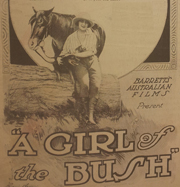 Notions of ‘the local’ in Australian filmmaking will be celebrated by Mr Andrew Pike, OAM, when he delivers a free public lecture at Charles Sturt University (CSU) in Bathurst at 6pm Friday 16 August.
Notions of ‘the local’ in Australian filmmaking will be celebrated by Mr Andrew Pike, OAM, when he delivers a free public lecture at Charles Sturt University (CSU) in Bathurst at 6pm Friday 16 August.‘Men and Women of the Bush in Early Australian Cinema’ is the topic of the biennial 2013 Theo Barker Memorial Lecture co-hosted by CSU and the Bathurst District Historical Society. The Theo Barker Memorial Lecture honours the memory of Mr Theo Barker, a much-loved and respected member of the Bathurst community and former history lecturer at Mitchell College of Advanced Education, one of the predecessor institutions of Charles Sturt University. Mr Barker was Bathurst's historian, the author of many publications, and a popular speaker on history.
Mr Pike is the principal of Canberra-based Ronin Films, and has an extensive background in film production and exhibition in Australia.
“Cinema was a vital part of local popular culture in the early decades of the medium,” Mr Pike said.
“In the 1910s, 20s and 30s, Australian filmmakers made films that targeted ‘the local’ - people, locations and stories. This is a long way from the trend that has prevailed since the ‘rebirth’ of Australian cinema in the 1970s when the primary target of filmmakers became ‘the faceless men in suits’ (film distributors and exhibitors) on the Croisette at the Cannes Film Festival in France.
“The popularity and the vitality of films like A Girl of the Bush are reminders of the power of ‘the local’, and give us a refreshing insight into the idiosyncrasies that emerged when filmmakers responded with honesty and enthusiasm to what was immediately around them, telling stories for audiences they could meet, know and understand.”
Mr Pike’s lecture will highlight how the popularity of bushrangers in early Australian films led to a ban on bushranger films by the NSW Police in 1912, which in turn led early filmmakers to emphasise women in the bush. He will explain that of the first fifty feature films made in Australia before the ban, about a quarter had a bushranger theme, with some of these featuring Bathurst-area bushrangers, including A Bushranger's Ransom, or A Ride for a Life, which was made in 1911 and evidence suggests that it may have been partially filmed in the Bathurst area.
“The Bathurst region had a significant role in the making of A Girl of the Bush, which was filmed locally in 1921, and is one of the earliest complete Australian films to have survived to this day,” Mr Pike said. “This film is important today, not only for film historians but also for social historians. I will show clips from this film, provided by the National Film and Sound Archives, to illustrate my lecture.”
 Mr Pike is a film distributor, film historian, documentary filmmaker and former exhibitor. With Ross Cooper, he wrote Australian Film 1900-1977, published by Oxford University Press. His films as director include the award-winning Angels of War (1982) about Papua New Guinea during World War II, The Chifleys of Busby Street (2008) (produced in collaboration with CSU adjunct lecturer in history Dr Robin McLachlan) about Australia’s post-war Prime Minister, Ben Chifley, and Emily in Japan (2010), an arts documentary commissioned by ABC TV. He has produced several documentaries for other directors, and managed the Electric Shadows cinema in Canberra for 27 years, from 1979 to 2006. His company, Ronin Films, has distributed many Australian films including Strictly Ballroom (1992) and Shine (1996), and 500 documentaries. In 2007, Mr Pike was awarded an OAM by the Australian government, and an honorary doctorate from the University of Canberra for his services to the film industry and community. In 2003, he was appointed by the French government to the rank of Chevalier dans L’Ordre des Arts et Lettres for Ronin’s promotion of French cinema in Australia. He served on the Board of the National Film and Sound Archive from 2008 to 2012, and is a member of the ACT Government’s arts policy advisory council.
Mr Pike is a film distributor, film historian, documentary filmmaker and former exhibitor. With Ross Cooper, he wrote Australian Film 1900-1977, published by Oxford University Press. His films as director include the award-winning Angels of War (1982) about Papua New Guinea during World War II, The Chifleys of Busby Street (2008) (produced in collaboration with CSU adjunct lecturer in history Dr Robin McLachlan) about Australia’s post-war Prime Minister, Ben Chifley, and Emily in Japan (2010), an arts documentary commissioned by ABC TV. He has produced several documentaries for other directors, and managed the Electric Shadows cinema in Canberra for 27 years, from 1979 to 2006. His company, Ronin Films, has distributed many Australian films including Strictly Ballroom (1992) and Shine (1996), and 500 documentaries. In 2007, Mr Pike was awarded an OAM by the Australian government, and an honorary doctorate from the University of Canberra for his services to the film industry and community. In 2003, he was appointed by the French government to the rank of Chevalier dans L’Ordre des Arts et Lettres for Ronin’s promotion of French cinema in Australia. He served on the Board of the National Film and Sound Archive from 2008 to 2012, and is a member of the ACT Government’s arts policy advisory council.




Social
Explore the world of social